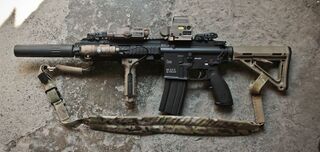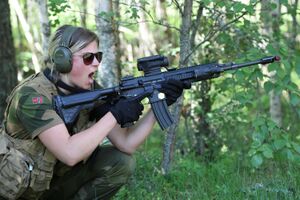RG 417
| RG 417 | |
|---|---|
 An RG 417 with ROTech 553, GEM Suppressor, SPESEC Stock, and RGM Frontgrip | |
| Type | Assault Rifle |
| Place of origin | |
| Service history | |
| In service | 2017–present |
| Used by | See Users |
| Wars | Imperial Crisis Chalcedonic War Neocon War |
| Production history | |
| Designed | 2012 |
| Manufacturer | Rainford Group |
| Produced | 2012-Present |
| Specifications | |
| Weight | 3.72 kg (8.2 lb) |
| Length | 1,035 mm (40.7 in) (stock extended) |
| Cartridge | .280 RG |
| Action | Gas-operated, rotating bolt |
| Rate of fire | 700–900 RPM |
| Muzzle velocity | 900 m/s (2,953 ft/s) |
| Effective firing range | 600 metres (2,000 ft) |
| Maximum firing range | 1,200 metres (3,900 ft) |
| Feed system |
|
| Sights | Various optics |
The RG 417 is a family of assault rifles first concepted in 2012 with the intention of replacing all service rifles within the Lucis Commonwealth of Nations.
Heavily influenced by the AR-4A1 Carbine and taking inspirations from the RG G4 SOPMOD series, the RG 417 is considered an indigenous design, inheriting several principles from the G4 and a proprietary short-stroke, gas piston system borrowed from the Gallian Richter & Manfred K36. The call for replacing all service rifles within the Commonwealth came largely following the passing of the Commonwealth Defence Act of 2012.
Following the success of trials in 2015, the RG 417 is slowly replacing the Steyrheim UAG and the G4 SOPMOD within the Erebonian Special Air Service and the Rubrumian Special Air Service. It is scheduled to replace the UAG in Erebonia and several other Commonwealth states, Great Lucis included. By 2020, it is estimated that the RG 417 has completely replaced all service assault rifles within Commonwealth Special Forces units, except for Concordia.
Design
In 2010, the Rainford Group, at the request of then-General Kiriya Kitagawa, sought to standardise the weapons used within the Commonwealth. The reason rooted from the experience of several Special forces units during the Second Lucis Civil War, who found it hard to resupply ammo to rifles with different platforms. During this time, Commonwealth Special Units were armed with the Steyrheim UAG, the RG G4 Carbines, and to some extent, the troublesome L85 Enfield. The weapon platforms couldn't share the same magazine, especially with the spec ops units often collaborating in certain military operations, in the case of the Special Operations and Airbourne Force.
The Rainford Group capitalised on its experience with developing small-arms weapons by borrowing the principles found on the Richter & Manfred K36, the Steyrheim UAG, and the upgrades made to the L85 Enfield. Following the implementation of the Commonwealth Defence Act of 2012, the company redesigned the rifle such that it would be possible to designate it as a standard issue for regular armies as well.
The first prototype was conceived in 2012. The rifle resembled the Concordian AR-4A1 Carbine aesthetically. Although the rifle itself was different internally, using a short-stroke gas piston system that significantly reduced malfunctions and jamming on traditional AR systems, as well as increasing the life span of internals.
During the trials in 2015, the new rifle proved superior in tests to the AR-4A1 Carbine, as well as the SOPMOD variants such that it didn't suffer failures and a fragmented receiver during water tests. It also proved superior in arctic and colder conditions over the existing AR-4A1 Carbines. It was officially adopted a few months later by the Erebonian Special Air Service, the Rubrumian Special Air Service and the Lucian Special Air Service as its standard issue assault rifle, rendering its previously issued rifles as obsolete.
Adoption
The RG 417 was only made standard issue by special forces units across the Lucis Commonwealth of Nations, with some retaining the use of the Steyrheim UAG and other weapon platforms. In trials, the RG 417 had the least amount of stoppages compared to other rivals. With combined special operations becoming the norm in the next few years, it was slowly adopted as standard issue in 2015. Originally it was to be standard issue as early as 2013, the Rainford Group could not produce enough rifles by 2013, which delayed its adoption by 2 years.
In 2020, a decision was made within well-known Allied Task Force 141 to replace all combat rifles with the 417, with the G4 SOPMOD finally being retired by 2025. Its purpose for staying in service longer than the UAG was its magazine similarities with the 417, prompting G4 and 417 users to share magazines in the field. In 2025, the last of the G4s were replaced by the 417 in the Erebonian Special Air Service, Rubrumian Special Air Service and the Lucian Special Air Service.
In 2027, it was later tested with stiff competition in the form of the Quenminese STC-08, Bethausian MA-11, Joyonghean K-2 Assault Rifle, Concordian AR-4A1 carbine, Richter & Manfred K36, and the Richter & Manfred G4. In a test of more than 2000 rounds, full-auto only, and in extreme conditions, the RG 417 significantly outperformed its competitors, with only 98 stoppages. It also proved to be superior in mud tests, having not a single jam compared to its competitors. It was also cleaner and easier to maintain than its counterparts, which further pushed for its adoption for regular army use. Later that year, the Erebonian Army, Lucis Army, Gallian Army, Rubrumian Army, Zanarkian Army, and New Akiba Army formally adopted the RG 417 as its standard service rifle.
Users
![]() Basel-Ebel
Basel-Ebel
![]() Erebonian Empire
Erebonian Empire
![]() Gallia-Bruhl
Gallia-Bruhl
![]() Jutland-Gimli
Jutland-Gimli
![]() New Akiba
New Akiba
![]() Nibelheim-Saxe-Hanover
Nibelheim-Saxe-Hanover
![]() Nihhon-koku
Nihhon-koku
![]() Rubrum
Rubrum
![]() United Kingdom
United Kingdom
![]() Zanarkand
Zanarkand



